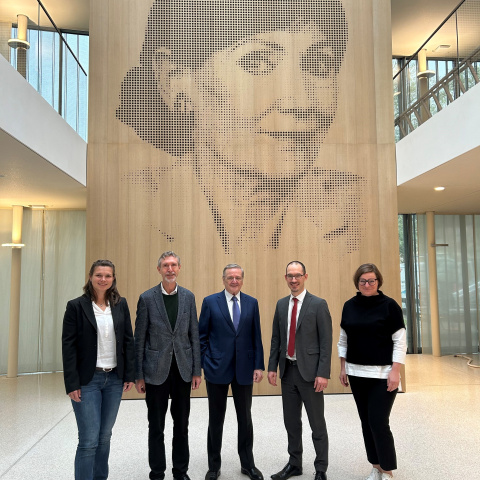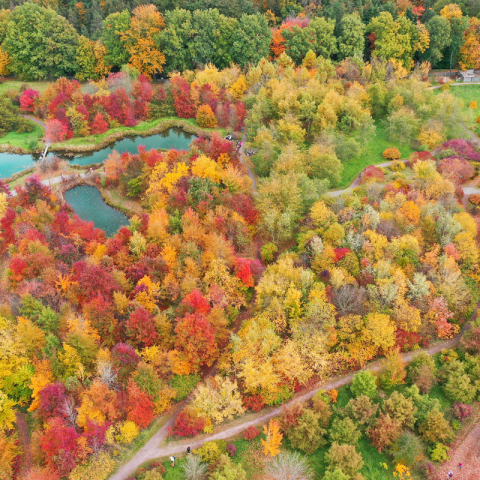Eva Mayr-Stihl Foundation supports forest-related environmental communication at TU Dresden with one million euros
Anyone studying forestry today knows that foresters don't just look after trees and maintain the forest. Their tasks also include advising forest owners, organising educational events in the forest and answering questions from forest visitors and those interested in the forest. Knowledge and skills in the area of this so-called ‘forest-related environmental communication’ are therefore in great demand. Corresponding courses already exist in the Bachelor's and Master's degree programmes in forest sciences at TU Dresden. Nevertheless, in a recent Germany-wide survey, many forestry students would like to see more courses on this subject and, above all, more opportunities to put their communication skills into practice.
In addition to teaching, research into communication about forests is also to be expanded. In recent years, the Department of Forest Sciences at TU Dresden has already realised a number of highly regarded research projects on this topic. The Eva Mayr-Stihl Foundation is now funding a junior research group on ‘Forest-related environmental communication’ at the Faculty of Forest Sciences in Tharandt (Chair of Forest Policy and Forest Resource Economics) from mid-2025 with a funding volume of just over one million euros. Robert Mayr, founder and Chairman of the Board of the Eva Mayr-Stihl Foundation, explains the reasons for the funding: ‘We have been supporting forest sciences in Tharandt for 30 years now, initially with smaller grants and later also with larger projects. The junior research group is intended to effectively support the further development of the discipline.’
Forestry as a link between trees and people
Mankind has always tried to observe and understand the environment. But most of what we know about the environment and the forest today, we do not observe ourselves. Instead, we learn about it at school or in the media. Prof. Dr Norbert Weber, Head of the Chair of Forest Policy and Forest Resource Economics, comments: ‘The way in which information about the forest is communicated determines to a large extent what we think about it and its managers and how we behave in the forest. In communicative processes - be it out in the forest, on social media, in companies or at home around the kitchen table - we exchange views on how the forest should be treated now and in the future. There is also a great deal of interest on the part of foresters in entering into dialogue with the various interest groups in the forest.’
This places high demands on the communicative competence of forestry stakeholders and justifies the need for sound training in the field of environmental communication. If possible, this should cover all essential components: Scientific communication, internal and external corporate communication, public relations, educational approaches such as forest pedagogy and education for sustainable development, as well as the necessary foundations from the communication, media and social sciences (e.g. human-forest relationships, target group segmentation, media-appropriate communication, media effects). Calls for greater consideration of these topics in forestry teaching and research have been repeatedly voiced from various quarters. Thanks to funding from the Eva Mayr-Stihl Foundation, a new junior research group entitled ‘Forest-related environmental communication’ can now be set up at the TU Dresden's Faculty of Forest Sciences in Tharandt from mid-2025 in order to meet the constantly growing demand.
Forest-related environmental communication in teaching and research
A fundamental task of the new junior research group will be to ensure, intensify and optimise the range of courses in the field of forest-related environmental communication. The main objective here is to plan, organise and implement more practical teaching and learning methods such as forest education events, forest tours, tree planting campaigns, social media campaigns, news blogs, discussion forums and forestry advice. In addition to teaching, the junior research group ‘Forest-Related Environmental Communication’ will also focus intensively on research in this subject area and promote networking with internal and external partners at the TUD. A special feature of research at Tharandt is the balanced consideration of the protection and utilisation of forests, while the latter aspect is becoming increasingly less important at other universities. This is precisely why it is important to explore how people's perceptions, attitudes and behaviour towards forests are changing. The new junior research group also wants to focus intensively on the research questions of how citizens can participate in future forest development, how cooperation with and between different forest owners can be more effective and how better information can be provided about the risks and consequences of climate change for forests and people.
The Eva Mayr-Stihl Foundation as an important partner
The Department of Forest Sciences at TU Dresden is currently endeavouring to strengthen its offerings in the field of social sciences. Thanks to the funding from the Eva Mayr-Stihl Foundation, the subject area of environmental communication with reference to forests can now be significantly expanded, resulting in synergy effects with other institutions at TU Dresden. The foundation is one of the largest charitable foundations in Germany and, in addition to medicine, art and culture, primarily supports forestry sciences. For example, the Eva Mayr-Stihl Foundation finances several endowed professorships, supports the Forest Botanical Garden in Tharandt and honours outstanding research work by young scientists with the German Forest Science Award.
Contact:
Prof. Dr. Norbert Weber
Head of the Chair of Forest Policy and Forest Resource Economics
E-Mail: norbert.weber@tu-dresden.de
Phone: +49 351 463-31828
Address: Stöckhardt-Bau, Raum E11, Pienner Straße 23, 01737 Tharandt

